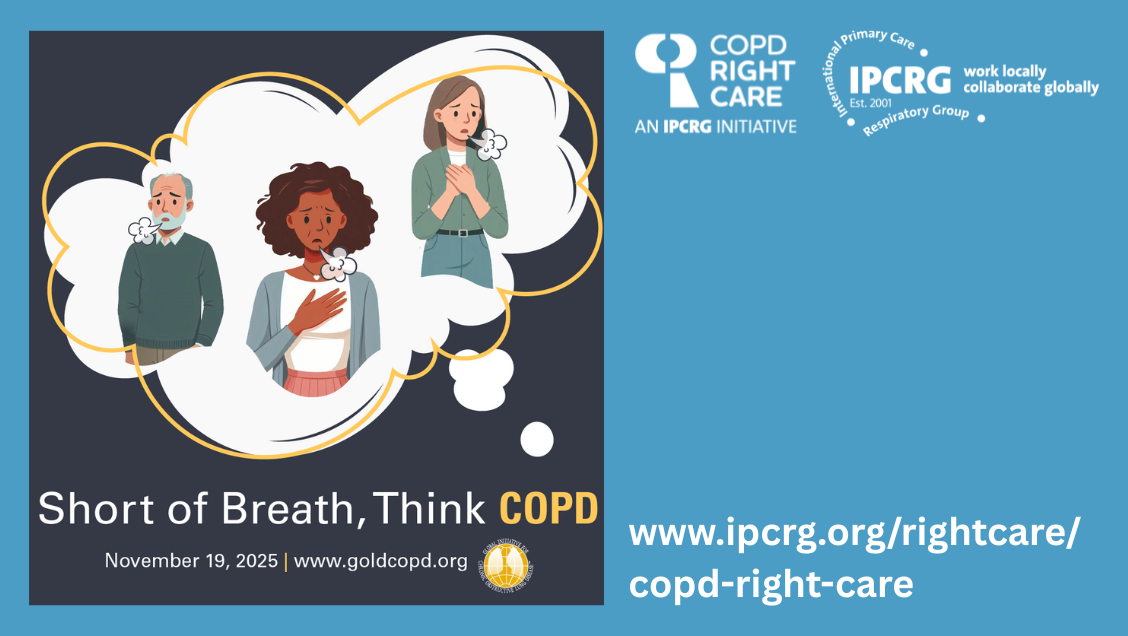World COPD Day 2025 - “short of breath, think COPD”
Published in General & Internal Medicine and Anatomy & Physiology

![]()
This blog was written by Joe Casson, who works as Project Support at the International Primary Care Respiratory Group, supporting the development of COPD Right Care as well as other IPCRG initiatives.
IPCRG resources for World COPD Day 2025: “short of breath, think COPD”.
Chronic obstructive pulmonary disease (COPD) is a long-term, incapacitating respiratory condition that can make everyday life very difficult.
The Global Burden of Disease Study for 2021 estimates that it affects 213 million people worldwide, and it is one of the top three leading causes of death globally, with around 90% of COPD deaths occurring in low and middle-income countries.
World COPD Day, organised by the Global Initiative for Chronic Obstructive Lung Disease (GOLD) in collaboration with professional and patient organisations across the world, aims to raise awareness, share knowledge and discuss ways to reduce the burden of COPD worldwide. In 2025, World COPD Day takes place on 19 November with the theme “short of breath, think COPD”, highlighting how extensive under-diagnosis and misdiagnosis of COPD can lead to no treatment or incorrect treatment, with a significant public health impact.
The International Primary Care Respiratory Group’s Change Programme, COPD Right Care, takes a social movement model, raising awareness of problems - including under-diagnosis and limited access to spirometry, underuse of smoking cessation, underuse of bronchodilation, overuse of inhaled steroids, underuse of pulmonary rehabilitation, and underuse of palliative approaches to manage every symptom - and gaining commitment to solve them. We want to humanise COPD by connecting people with lived experience to professionals, describe what optimal and safe treatment looks like and show why personalisation through shared decision-making is something we must champion. Right Care means doing the right things and only the right things in the right way for the right people at the right time in the right place, whatever that means in the local context.
To mark World COPD Day 2025, IPCRG is highlighting a range of resources we have produced that complement this year’s message on diagnosis:
- Desktop Helper No. 13 - Achieving earlier diagnosis of COPD: This desktop helper reviews the evidence for the benefits of earlier detection of COPD and provides healthcare practitioners with tools they can use to achieve this for the patients in their care.
- Desktop Helper No. 14 - Quick guide to spirometry: This desktop helper aims to provide primary care professionals with the information they need to prepare for, conduct, evaluate and interpret spirometry and understand its role and limitations in the diagnosis and monitoring of respiratory disease.
- Spirometry Simplified: Spirometry Simplified seeks to empower primary care clinicians worldwide by promoting the widespread and equitable adoption of spirometry. This certified course was meticulously crafted by an esteemed, experienced global faculty of master teachers of spirometry to primary care. This comprehensive programme equips primary healthcare professionals and their support staff with the essential skills to proficiently prepare for, conduct, assess, and interpret high-quality spirometry tests.
- Breaths: COPD essentials for primary care: Free, bite-sized and practical micro-learning exercises designed for busy primary care professions to enhance their capability, confidence and motivation in delivering high-quality respiratory care. We are currently mid-way through the release of our new collection, COPD essentials for primary care, with modules so far including COPD risks and prevention, earlier diagnosis of COPD and interpreting spirometry in primary care.
We also encourage all to tune in to the COPD Baton Pass on World COPD Day - a live, global broadcast bringing together healthcare professionals and people with COPD in learning and collaboration to elevate awareness, inspire participation and make a global impact, one lung-friendly exercise at a time. Last year, IPCRG colleagues presented on the COPD Magazine and physical activity (0h47m), dance for COPD (5h19m) and walking sports (7h6m). This year, IPCRG CEO Siân Williams will run an extended dance class for people with COPD from 9-10am UK time - make sure to block out the time in your diary to join!
COPD Right Care resources
IPCRG works with clinicians, researchers and people with COPD to develop user-friendly resources for primary care clinicians to improve COPD prevention, diagnosis and management and provide materials for use in primary care education. We also identify priorities where further research is needed and work with partners to take these forward.
We are regularly asked by primary care clinicians to define good quality care. We take the view that primary care is person-centred, and therefore the best way to define quality is from the perspective of the person at risk of, or with the condition. From our regular conversations with expert patients, we have summarised what good quality care should look like, from a patient perspective, and how clinicians can provide that, in 10 person-centred statements. These statements inform our strategy and the growing set of resources we have produced for the ‘Right Care’ of COPD, both for primary care clinicians and people with COPD, including:
- COPD Wheel: An interactive tool to start new conversations about personalising care for people with COPD - demo video available now and online version coming soon!
- COPD Question & Challenge Cards: These cards can be used to start conversations between clinical peers, with people with lived experience and with students about COPD, offering information and asking provocative questions to create more awareness of shortcomings in knowledge and understanding about COPD.
- COPD Magazine: An online magazine for people with COPD to support self-management. It embeds guidance, infographics and links to videos our expert team has curated to educate, motivate and inspire. 3 issues out now.
- Infographics to help self-manage your COPD: Use these infographics to share practical tips for self-managing COPD and explaining key concepts around physical activity and nutrition.
- 'How are you feeling right now?' Cartoons for emotional self-assessment for people with chronic respiratory diseases: Use these cartoons, which relatably depict the core emotions shown in the literature to be experienced across cultures and countries, to give people with chronic respiratory diseases an opportunity to identify and act on their emotions, creating more space for positive emotions and seeking help to shift the negative ones.
- Desktop Helpers: User-friendly and evidence-based guidance for primary care, providing practical support on different aspects of the diagnosis and management of respiratory diseases. Many of our Desktop Helpers are available in several languages and supported by additional resources such as case studies.
Follow the Topic
-
npj Primary Care Respiratory Medicine

This is an open access, online-only, multidisciplinary journal dedicated to publishing high-quality research in all areas of the primary care management of respiratory and respiratory-related allergic diseases.
🔍 Ask the Editor – Clinical medicine, Respiratory physiology, and Cardiology
I’m excited to connect with a global network of specialists through the Research Communities – how will you get involved?
Continue reading announcementRelated Collections
With Collections, you can get published faster and increase your visibility.
Scoping Reviews, Systematic Reviews and Meta Analyses in Primary Care Respiratory Medicine
Publishing Model: Open Access
Deadline: Ongoing
AI in primary care respiratory research
Publishing Model: Open Access
Deadline: May 28, 2026





Please sign in or register for FREE
If you are a registered user on Research Communities by Springer Nature, please sign in